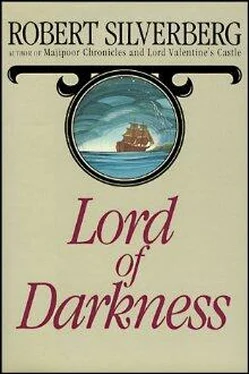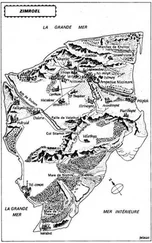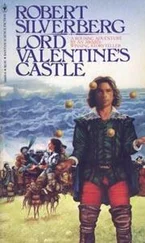Robert Silverberg - Lord of Darkness
Здесь есть возможность читать онлайн «Robert Silverberg - Lord of Darkness» весь текст электронной книги совершенно бесплатно (целиком полную версию без сокращений). В некоторых случаях можно слушать аудио, скачать через торрент в формате fb2 и присутствует краткое содержание. Год выпуска: 1983, ISBN: 1983, Издательство: Arbor House, Жанр: Исторические приключения, на английском языке. Описание произведения, (предисловие) а так же отзывы посетителей доступны на портале библиотеки ЛибКат.
- Название:Lord of Darkness
- Автор:
- Издательство:Arbor House
- Жанр:
- Год:1983
- ISBN:0-87795-443-7
- Рейтинг книги:5 / 5. Голосов: 1
-
Избранное:Добавить в избранное
- Отзывы:
-
Ваша оценка:
- 100
- 1
- 2
- 3
- 4
- 5
Lord of Darkness: краткое содержание, описание и аннотация
Предлагаем к чтению аннотацию, описание, краткое содержание или предисловие (зависит от того, что написал сам автор книги «Lord of Darkness»). Если вы не нашли необходимую информацию о книге — напишите в комментариях, мы постараемся отыскать её.
Lord of Darkness — читать онлайн бесплатно полную книгу (весь текст) целиком
Ниже представлен текст книги, разбитый по страницам. Система сохранения места последней прочитанной страницы, позволяет с удобством читать онлайн бесплатно книгу «Lord of Darkness», без необходимости каждый раз заново искать на чём Вы остановились. Поставьте закладку, и сможете в любой момент перейти на страницу, на которой закончили чтение.
Интервал:
Закладка:
That did not befall. But it was pleasant to dream upon it.
The first three days Torner and I were kept in chains, as though the Portugals feared we would seize the ship if left to our own. The metal was rusty and rough and chafed us most cruelly, so that our wrists bled and blazed with pain. We lay on deck like cords of timber, bound and stacked, and the seamen walked around us and paid us no mind, or sometimes glared and spat, or made the horns at us with their fingers, or did the cross with their hands as if to ward off the malign influence of demons.
I hated that hatred of theirs. What had I done to them? Refused to praise God in the Romish way? Sworn my allegiance to an English Queen instead of to their crazed King Philip, whom they despised themselves? That was the only true difference between us, that I was an Englishman and they Portugals, and yet they looked upon me as if I were a Turk, or some ravening fiend out of the nether hells. Why? Why? God’s truth, I had no hate for them, only for their religion. I do plead guilty to a certain dislike for their oily Portugal looks, but that only because such folk were unfamiliar to me and I preferred the good clean open-hearted look of Englishmen.
The sea-spray stung my eyes and in the rolling of the ship I was often bruised and once some great bird with a white breast and blazing red devil eyes flew slowly across the deck and dropped its dung on my forehead. Which gave the Portugal sailors much to laugh upon, and they did pound the decks with the flats of their palms in amusement at my expense.
But when the first heavy weather struck, there was need for all hands to work the rigging, even us. We were set free, rubbing our cramped tethered limbs to ease some blood back into them, and sent aloft to tug at the cords. And so we toiled beside those who had mocked us so sharply. It would have been no huge task to nudge one or two of them with an elbow and send them tumbling to their dooms as we scrambled about the topmasts; but that was madness, gaining me nothing but a watery death myself, or worse, and I forgot the scheme. And in a day or two the hatred of these men for us subsided: now we were fellow hands, was all. Though we ate apart and dined on slops, we were not again chained, and no one seemed to care that we were supposed to be prisoners. Aye, and where could we have escaped in mid-sea, save into the mouths of the sharks?
Our shipmates were a sullen and a surly lot. They fought often with one another and spoke in foul curses, and made mock of their officers behind their backs. Sometimes to their faces as well, and one morning in mid-ocean I heard loud shouts between a black-bearded crookbacked seaman and the second mate, which grew more angry until suddenly the seaman struck the second mate to the deck with a blow that shattered his nose and sent blood spurting an amazing distance. When that happened everything stood still upon the ship: the men in the rigging froze, and those working the pumps stood like statues, and those tightening the lanyards and tackles let go the ropes. The man who had struck the blow looked at his own hand as though he had never seen it before. For one does not strike officers at sea and live.
The man was seized and within an hour he was tried and his fate was set, and it was to be the lash. Every hand not needed to work the ship was called into assembly, and the seaman was tied to a mast, and a gigantic Portugal with arms as thick as anyone else’s legs was the wielder of the whip.
Now I am not one of your Londoners who goes out to every execution and stands with the crowd from earliest dawn, waiting to get a good view. I see no entertainment to be had from attending a beheading, with all that gore and welter and the dead head held high afterward, or going to a burning, and seeing good human flesh char to a crisp while hideous cries break the air. And though I know the favorite of the crowds is the drawing and the quartering, where they hang some poor soul until he is half dead, and cut him down and cut from him his privy parts and take from him his entrails and burn them in his view, and only then to behead him and divide his body in sections, it was never my pleasure to witness such a festivity. It is not that I am overly womanish and finicky and easily sickened by harsh sights, but only that I am a man of Essex, never raised to enjoy the city amusements: let the wicked be properly punished, say I, but I will take my sport elsewhere. But this flogging I did watch—I had no choice, for all hands attended, and I could not help but look on. The crookbacked sailor was one I notably disliked: he was one of those who had most jeered us when we were in chains, and I had felt his spittle and worse, and once when Torner and I were given a little wine to drink he had knocked my bowl from my hand, in seeming accident. So I scarce regretted that they were doing him to death. Yet flogging is a terrible way to die.
They ripped from him his shirt, laying bare his ill-matched shoulders and his little hump, and the lashes commenced falling. You know that the whip used at sea is no small horse-flicking thing, but a great horrific leather monster, and as it rose and fell and rose and fell it cut the villain’s flesh apart like a saber. Sweat oiled the body of the enormous whipper until he glistened like a buttered statue. I heard the whistling of the whip in the air and the crack against flesh and muscle, and on the fifteenth lash the man seemed to lose consciousness, and on the twentieth he stopped moaning, and still the whip descended, with scarce a pause for the whipper’s breath. It cut the man to tatters. There was no need to go all the way to one hundred, for bone was showing by the fiftieth or earlier, and the deck was stained; but to the end they went, and then the ship’s priest gave Popish blessings to what certainly was a dead man, and they sacked him and put him over the side. For days afterwards I saw when I closed my eyes that whip coursing through the air. And I saw also the anatomy lesson that they had made out of the sailor’s back, that discourse on flesh and muscle and bone. To Torner I said, “If they ever ask me to choose my death, remind me to select the headman’s axe.”
“Aye. Who would not? But only a fool strikes an officer, and a flogging is a good education for a fool.”
“And for all the other fools who saw it done,” I said.
After that there was less bickering on board, and ready obedience to the orders of the mates. The stains remained in the boards for many a day. Well, and the English fleet must do its floggings just as grimly; but I am in no hurry to observe the niceties of the method a second time.
Of all the Portugals only one spoke sociably to us the whole voyage. This was a certain Barbosa, a peaceful man with a pleasant way, who was some sort of tax-collector for King Philip, and traveled an endless weary route between Brazil and Africa. He was older than the others, with a fine taste in clothing and an elegant broad-brimmed hat that he wore cavalier-fashion, shoved down over one eye. He spoke good English, and often at dusk he came to us as we stood by the rail, and talked of the land toward which we were going.
The Portugals, he said, had but a tiny purchase there. They had gulled several of the African kings into taking them in, and even into swallowing the holy bread and wine of the Romish rite and christening themselves with Portuguese names, so that this blackamoor monarch was now Don Affonso and that one Don Alvaro, and the Duke of This and That, the Marquess of That and This. But for all that there were mere little islands of Portuguese civilization on the African coast surrounded by great dark pools of monstrous night, and warfare was constant between the Portugals and their unwilling hosts, and also with a cannibal tribe called the Jaqqas that roved like demons in the back country. Barbosa was of two minds of all this. “It is a deadly land, full of vile malarias and secret venoms. And yet it has beauty and riches, and we will make of it, if God give it to us, another Mexico, another Peru.”
Читать дальшеИнтервал:
Закладка:
Похожие книги на «Lord of Darkness»
Представляем Вашему вниманию похожие книги на «Lord of Darkness» списком для выбора. Мы отобрали схожую по названию и смыслу литературу в надежде предоставить читателям больше вариантов отыскать новые, интересные, ещё непрочитанные произведения.
Обсуждение, отзывы о книге «Lord of Darkness» и просто собственные мнения читателей. Оставьте ваши комментарии, напишите, что Вы думаете о произведении, его смысле или главных героях. Укажите что конкретно понравилось, а что нет, и почему Вы так считаете.












